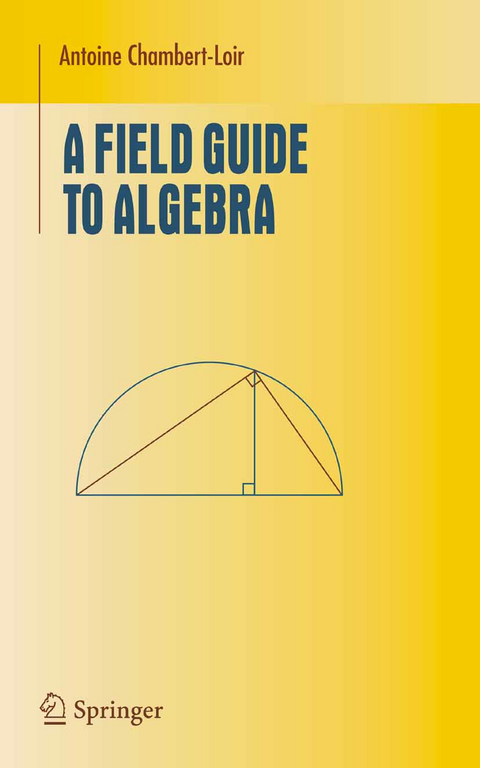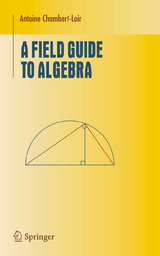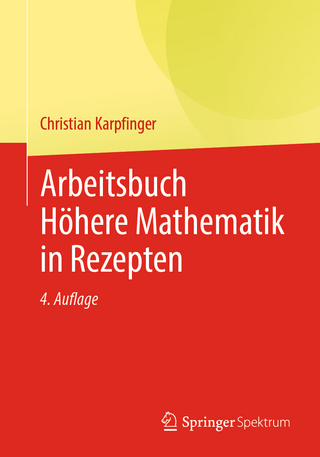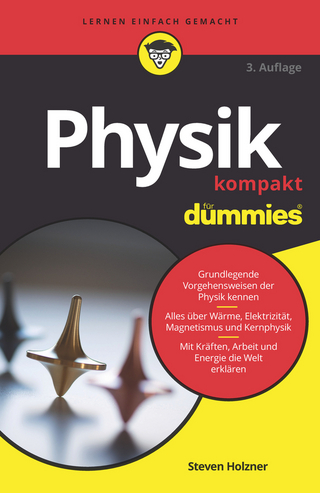A Field Guide to Algebra
Seiten
2004
Springer-Verlag New York Inc.
978-0-387-21428-3 (ISBN)
Springer-Verlag New York Inc.
978-0-387-21428-3 (ISBN)
Focuses on the structure of fields and is intended for a second course in abstract algebra. This book provides proofs of the transcendence of pi and e. It explores equations, both polynomial and differential, and the algebraic structure of their solutions.
This is a small book on algebra where the stress is laid on the structure of ?elds, hence its title. Youwillhearaboutequations,bothpolynomialanddi?erential,andabout the algebraic structure of their solutions. For example, it has been known for centuries how to explicitely solve polynomial equations of degree 2 (Baby- nians, many centuries ago), 3 (Scipione del Ferro, Tartaglia, Cardan, around th 1500a.d.), and even 4 (Cardan, Ferrari,xvi century), using only algebraic operations and radicals (nth roots). However, the case of degree 5 remained unsolved until Abel showed in 1826 that a general equation of degree 5 cannot be solved that way. Soon after that, Galois de?ned the group of a polynomial equation as the group of permutations of its roots (say, complex roots) that preserve all algebraicidentitieswithrationalcoe?cientssatis?edbytheseroots.Examples of such identities are given by the elementary symmetric polynomials, for it is well known that the coe?cients of a polynomial are (up to sign) elementary symmetric polynomials in the roots. In general, all relations are obtained by combining these, but sometimes there are new ones and the group of the equation is smaller than the whole permutation group. Galois understood how this symmetry group can be used to characterize the solvability of the equation. He de?ned the notion of solvable group and showed that if the group of the equation is solvable, then one can express its roots with radicals, and conversely.
This is a small book on algebra where the stress is laid on the structure of ?elds, hence its title. Youwillhearaboutequations,bothpolynomialanddi?erential,andabout the algebraic structure of their solutions. For example, it has been known for centuries how to explicitely solve polynomial equations of degree 2 (Baby- nians, many centuries ago), 3 (Scipione del Ferro, Tartaglia, Cardan, around th 1500a.d.), and even 4 (Cardan, Ferrari,xvi century), using only algebraic operations and radicals (nth roots). However, the case of degree 5 remained unsolved until Abel showed in 1826 that a general equation of degree 5 cannot be solved that way. Soon after that, Galois de?ned the group of a polynomial equation as the group of permutations of its roots (say, complex roots) that preserve all algebraicidentitieswithrationalcoe?cientssatis?edbytheseroots.Examples of such identities are given by the elementary symmetric polynomials, for it is well known that the coe?cients of a polynomial are (up to sign) elementary symmetric polynomials in the roots. In general, all relations are obtained by combining these, but sometimes there are new ones and the group of the equation is smaller than the whole permutation group. Galois understood how this symmetry group can be used to characterize the solvability of the equation. He de?ned the notion of solvable group and showed that if the group of the equation is solvable, then one can express its roots with radicals, and conversely.
Antoine Chambert-Loir is Professor at Université de Rennes 1.
Field extensions.- Roots.- Galois theory.- A bit of group theory.- Applications.- Algebraic theory of differential equations.
| Reihe/Serie | Undergraduate Texts in Mathematics |
|---|---|
| Zusatzinfo | X, 198 p. |
| Verlagsort | New York, NY |
| Sprache | englisch |
| Maße | 155 x 235 mm |
| Themenwelt | Mathematik / Informatik ► Mathematik ► Algebra |
| Mathematik / Informatik ► Mathematik ► Arithmetik / Zahlentheorie | |
| ISBN-10 | 0-387-21428-3 / 0387214283 |
| ISBN-13 | 978-0-387-21428-3 / 9780387214283 |
| Zustand | Neuware |
| Haben Sie eine Frage zum Produkt? |
Mehr entdecken
aus dem Bereich
aus dem Bereich
Buch | Softcover (2022)
Springer Spektrum (Verlag)
39,99 €




